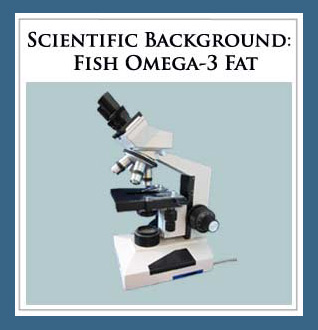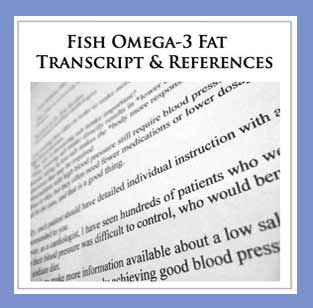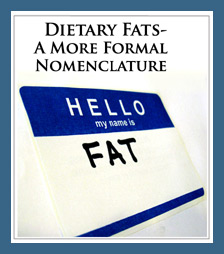
Fish Omega-3 Fat Scientific Background
Eric Roehm, M.D. 2011
The following discussion examines the four fish omega-3 trials positive for significant benefit in cardiovascular patients and the two recent major trials that showed no benefit of fish omega-3 fats. Some of the possible explanations for the differences in outcome are reviewed.
For a general review of the scientific background of fish omega-3 fats, please see the transcript with references of the fish omega-3 fat talk.
Fish omega-3 fat comes from marine life. Fish omega-3 fat intake has been associated with multiple health benefits in population based studies.
The largest body of evidence of benefit for fish omega-3 intake is with cardiovascular disease. The benefit of fish omega-3 fat intake first came to the attention of researchers when it was noticed that Eskimos, whose traditional diet consists of eating a very large amount of fish omega-3 fat, had a very low rate of cardiovascular disease.
There were subsequently 3 randomized trials showing a reduction in death rate and cardiovascular events in certain groups of patients with heart disease. There was also a trial that showed a reduction in heart attack rate for a group of patients with high cholesterol when treated with high dosages of fish omega-3 fat and followed for 5 years.
There have also been several recent randomized trials that have not shown benefit. A close examination of these trials reveals several possible reasons for this disparity of outcome.
Summary of major randomized trials showing benefit in mortality or heart attack rate with fish omega-3 fat:
1. The GISSI-Prevenzione trial (1999) involved over 8,000 patients who had a heart attack within 3 months of having entered the trial and who were randomized to 850-882 mg of fish omega-3 fat in the form of EPA (eicosapentaenoic acid) and DHA (docosahexaenoic acid) or no supplementation. There was a statistically significant reduction in both cardiovascular events and deaths (14-20% reduction for various endpoints).
2. The DART trial (Diet and Reinfarction Trial) (1989) involved 2,033 patients who had a heart attack within 3 months of entering the trial. The randomized dietary intervention of interest is that half the patients were assigned a diet high in fish where they were encouraged to eat at least 2 servings of fish weekly or take fish omega-3 pills if that was not possible vs. no special effort to eat fish. The fish intervention group ate significant quantities of fish and averaged 2.3 grams of eicosapentaenoic acid (EPA) per week. Though data was not provided on DHA content of the fish, given the location of the trial (Wales) and the type of fish reported to be eaten, an estimate of DHA weekly intake is 2.75 grams7. This would result in the equivalent of an average daily intake of 720mg of DHA and EPA daily as a conservative estimate. (For the 14% of the group who could not eat fish, fish oil capsules were given.)
This trial, performed in the 1980s, had approximately 15% of the patients on either an antiplatelet drug like aspirin or a blood thinner and 30% on a class of drugs called beta blockers which help prevent heart arrhythmias and future additional heart attacks.
3. The GISSI-HF trial3 (GISSI-Heart Failure Trial) (Lancet 2008) consisted of 7046 patients with congestive heart failure who were randomized to 850-882mg of EPA and DHA in a capsule or a placebo. The patients all had evidence of heart failure. The heart failure was on the basis of blockages of the arteries of the heart in approximately 49% of the patients. Treatment included beta blockers in 65%, either antiplatelet agents or anticoagulants in 77% of the patients, and either ACE inhibitor or angiotensin receptor blockers ≈96% of the patients. (Statins (rosuvastatin) were also randomized in this trial, but showed no benefit for this particular group of patients.
The patients treated with omega-3 fat capsules had a small but statistically significant decrease (9% less than the placebo group) in total mortality. There was no early improvement between the groups and no improvement in mortality began to occur until after over 2 years of omega-3 intake was started.
4. The JELIS trial (Japan EPA Lipid Intervention Study) (Lancet 2007) consisted of 18,645 Japanese patients with cholesterol all who were treated with a low dose statin medication. The patients were randomized to either 1800 mg of EPA omega-3 type fat or no medication. No placebo was used, but the endpoint evaluation of the patients was blinded. Approximately 20% of the patients had a history of prior heart attack, coronary bypass surgery, or angina. All the patients in the trial were on a low dose statin medication as well.
There was a 19% reduction in major coronary events. Though there was some early improvement, the majority of the benefit developed after 2 ½ year of omega-3 intake. There was no improvement in overall mortality in this trial.
What about the two major recent trials showing lack of benefit?
One trial, the Alpha Omega trial used a total dose of 376mg of EPA and DHA. This lower dose of fish omega-3 fat has not been used in any of the randomized trials showing benefit. Though population based descriptive studies may suggest a lower dosage of fish omega-3 fat is beneficial, once a randomized trial has demonstrated benefit, that information takes precedence in regards to reliability. (The FDA, as an example, never releases a new drug with the dosage to be used determined by uncontrolled nonrandomized studies, but only with the information based on the randomized trials because this information is the most reliable guide to benefit and risk.). Other features of this trial include that the participants were on the average 4 years (up to a maximum of 10 years) from the time of the most recent heart attack.
Hence, this trial used a substantially lower dosage of fish omega-3 fat intake compared to the randomized trials that have shown benefit. The population of patients treated was also different in that they had a heart attack years before rather than recently, and had a much higher use of statin medication.
The other recent trial with no evidence of benefit was the Omega trial which randomized 3,851 patients within 2 weeks of having a heart attack and followed them one year. There was early treatment of the patients with percutaneous coronary intervention (balloon dilation of the heart artery of the heart which usually consists of a stent placed during the same procedure) in 78 % of the patients. The majority of the patients received very potent inhibition of their platelets with two antiplatelet agents being used in approximately 88% of the patients (aspirin and clopidogrel) as is routine following balloon dilation of the arteries of the heart..
One of the prominent effects of significant fish omega-3 fat ingestion is the extension of bleeding times which reflects platelet inhibition. This results in the platelets not aggregating or clumping as easily, something that occurs whenever the body forms either a beneficial or harmful clot.
The patients in this trial, in contrast to the trials showing benefit, had their platelets inhibited and bleeding times extended to the maximal potential benefit before the addition of fish omega-3 fat. Hence, the addition of fish omega-3 fat would not be expected to be helpful in this regard. Furthermore the patients in this trial differed from the other the trials showing benefit in that the majority of the patients had arteries of the heart that were treated with balloon dilation and stenting. Hence, the lack of benefit during the first year of follow up in this trial of fish omega-3 fat may well be the result of a different patient population in regards to treatment with dual antiplatelet drugs and having undergone coronary stenting. In addition, the majority of patients in the trial were also receiving statins (94%) and beta blockers (94%) in contrast to the trials positive for benefit of fish omega-3 fat intake
In regards, to duration of follow up, the heart failure patients, who were a very different population, showed no benefit of fish omega-3 fat intake at 18 months, but did ultimately show benefit later with the average treatment duration being 4 years.
Meta- analysis
One approach to looking at the benefit of fish omega-3 fat is to do a meta-analysis (combine the summation of the results of all the trials in one analysis of all the fish omega-3 fat randomized trials. Meta-analysis is with its own substantial potential limitations.
In this case, there have been 3 separate randomized trials which showed benefit in mortality indicating that a benefit exists for certain patient populations, though not all patient populations given the negative trials. Grouping trials in a meta-analysis that are treating different populations can obscure benefit that exists for specific populations.
As an example of this problem, consider the situation if there were randomized antibiotic trials limited to patients with bacterial infections showing benefit and other trials involving patients solely with viral ear infections showing no benefit with antibiotics. Assume antibiotics help bacterial ear infections, but not viral ear infections. If a meta- analysis of studies for antibiotics for all ear infections included both types of patients, the benefit of antibiotics for bacterial ear infections may well be obscured by the inclusion of different types of patients who responded to the treatment being evaluated in a very different manner.
Given the 3 separate randomized trials showing a significant reduction in death rates with fish omega-3 fat, this suggests a true benefit exist for specific cardiac populations treated in a specific fashion, at least when the dosage of fish omega-3 fat and the duration of follow up is sufficient.
————-
1. Burr ML, Fehily AM, Gilbert JF, et al. Effects of changes in fat, fish, and fibre intakes on death and myocardial reinfarction: diet and reinfarction trial (DART). Lancet 1989;ii:757-61.
2. GISSI-Prevenzione Investigators. Dietary supplementation with n-3 polyunsaturated fatty acids and vitamin E after myocardial infarction: results of the GISSI-Prevenzione trial. Lancet 1999;354:447-55.
3. GISSI-Prevenzione Investigators, Tavazzi L, Maggioni AP, Marchioli R, et al. Effect of n-3 polyunsaturated fatty acids in patients with chronic heart failure (the GISSI-HF trial): a randomised, double-blind, placebo-controlled trial. Lancet 2008;372:1223-1230.
4. Yokoyama M, Origasa H, Matsuzaki M, et al.; Japan EPA lipid intervention study (JELIS) Investigators. Effects of eicosapentaenoic acid on major coronary events in hypercholesterolaemic patients (JELIS): a randomised open-label, blinded endpoint analysis. Lancet. 2007;369:1090-8.
5. Kromhout D, Giltay EJ, Geleijnse JM, Alpha Omega Trial Group. n-3 fatty acids and cardiovascular events after myocardial infarction. N Engl J Med 2010; 363:2015-26.
6. Rauch B, Schiele R, Schneider S, Diller F, et al. OMEGA, a randomized, placebo-controlled trial to test the effect of highly purified omega-3 fatty acids on top of modern guideline-adjusted therapy after myocardial infarction. Circulation 2010; 122:2152-9.


